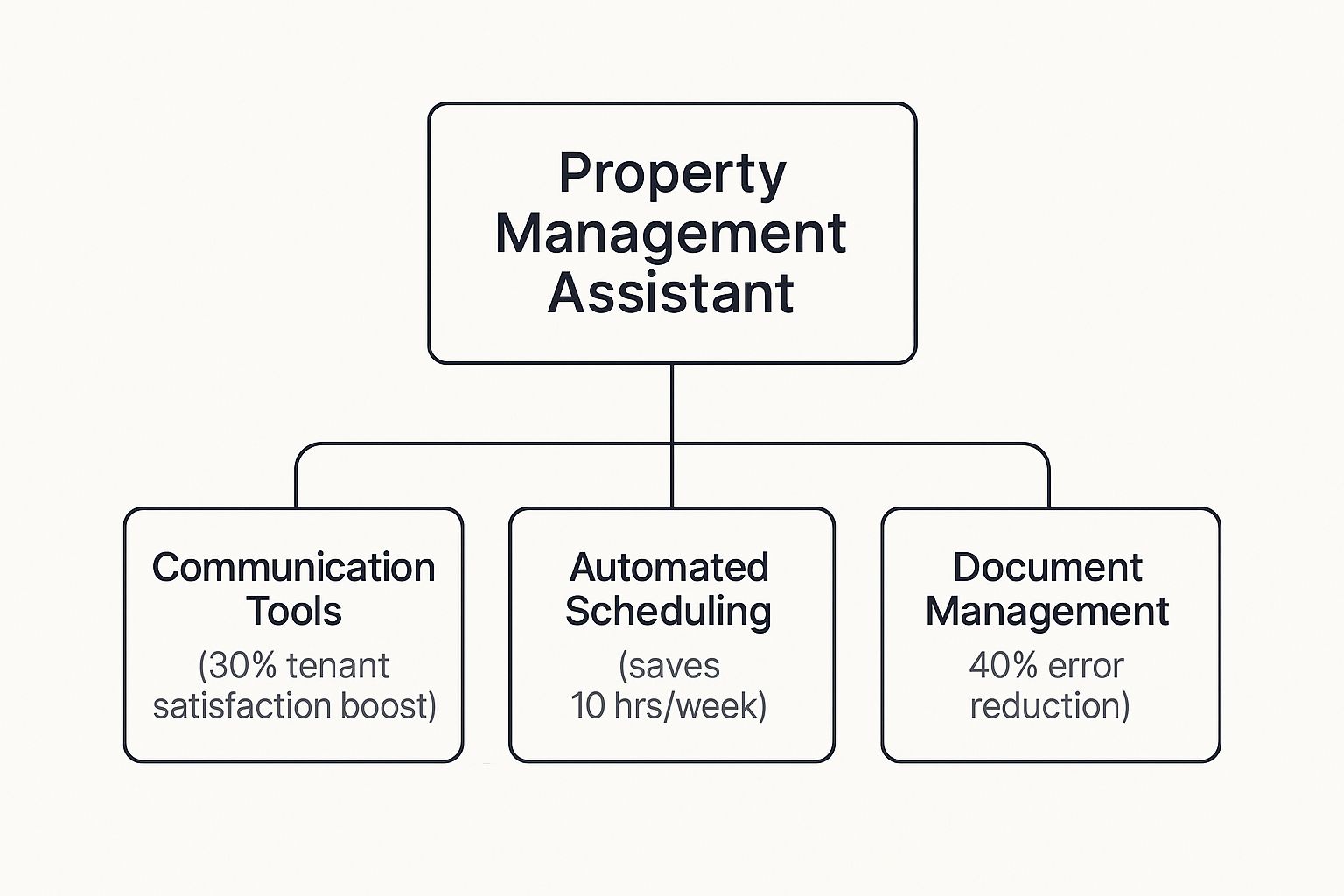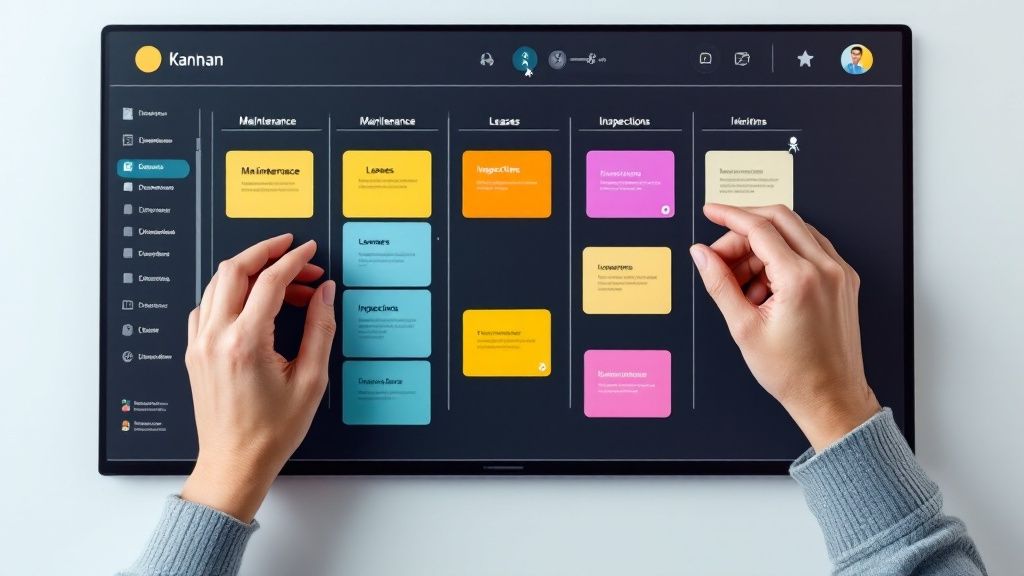A property management assistant is the operational heart of a real estate agency, the person responsible for coordinating all the moving parts that keep properties running like a well-oiled machine. Think of them as the crucial link between tenants, landlords, and property managers, handling everything from paperwork to client communication. Ultimately, their work is what creates a positive experience for everyone involved.
The Backbone of Every Real Estate Agency

Imagine an air traffic controller, coolly guiding dozens of planes through a chaotic airport. That’s pretty much the property management assistant for a real estate agency—they're the central hub making sure everything lands smoothly. This role is so much more than just admin support; it’s the engine room that keeps tenants happy, landlords in the loop, and properties turning a profit.
Without this key player, property managers would be completely swamped by the daily flood of calls, emails, and maintenance requests. The assistant is that essential first point of contact, expertly juggling a massive range of responsibilities.
A Glimpse into the Daily Routine
A day in the life of a property management assistant is anything but predictable. One minute they could be fielding a frantic call about a burst pipe, and the next, they're carefully vetting a new rental application. Their daily grind is all about maintaining order and efficiency.
Key activities often include:
- Coordinating Maintenance: Getting plumbers, electricians, and other tradies scheduled for repairs and general upkeep.
- Managing Tenant Enquiries: Answering questions about leases, rent payments, and property rules.
- Handling Administrative Tasks: Prepping lease agreements, keeping records straight, and helping with financial reporting.
- Conducting Inspections: Assisting with routine property inspections to make sure everything is in good nick.
This constant multitasking is vital for boosting overall property management efficiency and freeing up senior staff to focus on the big-picture decisions.
The role demands a unique blend of organisational wizardry, top-notch communication skills, and a whole lot of resilience. A great assistant doesn't just tick off tasks—they anticipate needs and solve problems before they blow up, which directly builds the agency's reputation and success.
This profession is also sitting in a booming industry. The Australian property management market hit USD 8.1 billion in 2024 and is expected to climb to USD 11.0 billion by 2033, showing just how stable its growth is. You can dig into more of these market trends and what’s driving them in this detailed report.
Breaking Down the Core Responsibilities
So, what does a property management assistant actually do all day? If you’re picturing someone just answering phones and filing paperwork, think again. This is a dynamic, hands-on role that sits right at the heart of the action, blending organisation, finance, and people skills into one crucial function.
Think of them as the operational linchpin. They’re the ones handling all the essential details that allow the property manager to step back and focus on the bigger picture.
To really get a handle on the job, it helps to break it down into its core parts. These responsibilities all weave together, meaning an assistant has to be a master of switching hats. One minute they’re dealing with an urgent maintenance call, which isn't just a logistics issue—it's a customer service moment and a financial transaction all rolled into one.
This infographic gives a great snapshot of how modern tools are helping assistants juggle these diverse tasks way more effectively.

As you can see, bringing in the right tools for communication, scheduling, and documentation isn't just a nice-to-have. It leads to real wins in tenant happiness, time saved, and getting things right the first time.
Let's dive a little deeper into the specific duties that make up this role. The table below gives a clear overview of the day-to-day tasks you can expect.
Key Duties of a Property Management Assistant
| Category | Specific Tasks | Key Skill Required |
|---|---|---|
| Administrative | Processing rental applications, managing lease agreements, coordinating property inspections, maintaining tenant and landlord records. | Meticulous Organisation |
| Financial | Assisting with rent collection, following up on arrears, processing supplier invoices, preparing financial statements. | Attention to Detail |
| Communication | Acting as the first point of contact for tenants and landlords, handling maintenance requests, onboarding new tenants. | Empathy & Professionalism |
Each of these categories is a pillar of a well-managed property portfolio, and the assistant is central to keeping them all standing strong.
Administrative and Organisational Duties
At its core, a property management assistant’s job is to bring order to what could easily become chaos. This means a hefty amount of admin that forms the backbone of a smoothly run portfolio. Without someone keeping meticulous records and following through, things can go pear-shaped, fast.
A few of the key tasks include:
- Processing Rental Applications: This is everything from collecting the initial forms to running background checks and getting all the paperwork ready for the property manager to sign off.
- Lease Administration: They’re the ones preparing new lease agreements, managing renewals, and making sure every tenant file is accurate and completely up-to-date.
- Coordinating Inspections: Assistants schedule routine, entry, and exit inspections, liaise with tenants and property managers, and file all the reports once they're done.
Essentially, the assistant is the guardian of the property's history. They make sure every single interaction, from a leaky tap to a signed lease, is properly documented and above board.
Financial Support Functions
While the property manager has the final say on the financials, the assistant is deep in the trenches, managing the day-to-day flow of money. Accuracy is absolutely non-negotiable here; even small mistakes can quickly erode trust with both tenants and owners.
A huge part of the assistant's role is making sure the financial engine of the property is humming along nicely. That means chasing up late rent, paying tradies, and putting together clear reports so the property manager always knows where things stand financially.
You'll find them assisting with rent collection, following up on overdue payments, processing invoices from plumbers and electricians, and helping prepare the monthly statements for landlords. It's a fantastic real-world education in real estate finance for anyone looking to build a career in the industry.
Client and Tenant-Facing Communication
This is where a truly great property management assistant makes their mark. They are almost always the first person a tenant speaks to, and they have to handle a massive range of enquiries with a cool head and a bit of empathy.
For instance, when a tenant calls about a leaking tap, the assistant doesn’t just log a ticket. They calm the tenant down, get the important details, call a trusted plumber from their list, and then circle back to make sure the job was done right.
It’s the same when a new tenant comes on board. The assistant guides them through the lease, explains everyone’s rights and responsibilities, and makes them feel welcome. This first impression sets the tone for the entire tenancy, and a good assistant knows how to start it off on the right foot.
The Skills That Define a Successful Assistant

Knowing the duties of a property management assistant is one thing. Actually having the skills to pull them off day in, day out is another beast entirely. The real difference between a good assistant and a truly indispensable one comes down to a special mix of technical know-how and people skills.
It's not just about ticking off a to-do list; it’s about how you get it done.
Think of it like being a great chef. Anyone can follow a recipe, but a top chef understands the chemistry of flavours, the art of plating, and how to keep their cool during a hectic dinner service. In the same way, a standout assistant masters both the 'what' and the 'how' of their role, turning daily headaches into chances to shine.
Essential Hard Skills for the Role
Hard skills are the bread and butter—the technical, teachable abilities you need to do the job properly. In property management, these are completely non-negotiable and form the foundation of your competence. They’re the practical tools in your kit that keep the portfolio ticking over.
A successful property management assistant has to be all over:
- Property Management Software: You need to be fluent in platforms like PropertyMe, Console Cloud, or Property Tree. These are the command centres for everything from leases and maintenance to the money side of things.
- Understanding Tenancy Legislation: A solid grasp of the Residential Tenancies Act in your state is an absolute must. This knowledge is your guide for everything from drafting a lease agreement to handling a bond claim without a hitch.
- Basic Financial Acumen: You don't need to be an accountant, but you do need to be comfortable with numbers. We're talking about processing invoices, chasing up arrears, and helping with financial reports.
Mastering Crucial Soft Skills
While the hard skills might get you in the door, it’s the soft skills that make you truly brilliant at your job. These are the people skills that shape how you deal with tenants, landlords, and your own team, especially when the pressure is on.
The ability to communicate with empathy, professionalism, and clarity is arguably the most critical skill you can have. You are the frontline for tenant disputes, maintenance frustrations, and landlord queries. How you handle those conversations has a direct impact on the agency's reputation.
Exceptional communication is the bedrock of any solid client relationship. If you're looking to really sharpen these abilities, exploring key business communication skills can give you a massive advantage in such a client-facing role.
Beyond that, you’ll need rock-solid organisation, proactive problem-solving, and a healthy dose of emotional resilience to navigate the daily pressures with a steady hand.
Mapping Your Career and Salary Progression
Think of the property management assistant role not as a final stop, but as a launchpad. It’s your apprenticeship in the real estate world, where you really learn the ropes from the ground up. This job gives you a front-row seat to every part of managing a property portfolio, which perfectly sets you up for a clear and rewarding career path.
With a bit of grit and experience under your belt, an assistant naturally moves up into more senior roles. It’s a pretty common and logical track within most real estate agencies.
This hands-on experience is gold. You're not just learning theories from a textbook; you're living the day-to-day realities of tenant dramas, legal compliance, and keeping the books in order. That’s the exact stuff you need to take the next step.
The Typical Career Trajectory
Your career journey usually follows a well-trodden path. Each step brings more responsibility, more freedom, and of course, a bigger paycheck. While every agency has its own way of doing things, the progression generally looks a bit like this:
- Property Management Assistant: This is where it all starts. You’re providing crucial support, tackling the admin, and learning the fundamentals from a senior manager who’s seen it all.
- Property Manager: Once you've got the assistant role down pat, you can step up to manage your own portfolio of properties. This means you’re directly responsible to landlords, making key decisions, and handling the more complex tenant headaches yourself.
- Senior Property Manager or Department Head: After a few years of solid experience and a proven track record, you can move into a leadership position. You’ll be overseeing a team of property managers, looking after the agency’s most valuable portfolios, and helping shape the department's strategy.
You can think of this like moving from a first mate to a ship's captain. As an assistant, you're a vital part of the crew, learning how to navigate. As a property manager, you get command of your own vessel. And as a senior manager, you’re the one charting the course for the entire fleet.
Understanding Your Earning Potential
As you rack up more experience and skills, your salary as a property management assistant will naturally climb. The pay varies across Australia, but the data gives us a pretty solid idea of what to expect.
For example, market data shows an Assistant Property Manager's pay packet is heavily tied to experience. According to Indeed, the average salary is sitting around AU$63,248 per year. Other sources like Jobted report a slightly lower average of AU$51,330. If you’re just starting out with less than a year of experience, you’re often looking at a total package around AU$45,256, which scales up as you build your expertise. You can dig into more detailed salary insights and see how things like location can affect your pay.
This climb in pay simply reflects the value you bring to the table. The more skilled you become and the bigger challenges you take on, the more your financial rewards will grow, making this a solid and financially stable career for the long haul.
How Technology Is Reshaping the Assistant Role

Let's be clear: technology isn't making the property management assistant obsolete. It's making them more powerful. The role is shifting away from repetitive, manual tasks and moving towards strategic, high-value work. This change is all about empowering assistants to focus on what humans do best—building relationships and solving complex problems.
Think of it this way. The old-school assistant was buried under a mountain of paperwork. Today’s assistant is more like a pilot in a modern cockpit. They have powerful tools at their fingertips that handle routine functions, letting them focus on navigating the bigger picture to ensure a smooth journey for tenants and landlords.
This evolution is creating a more dynamic and fulfilling career, turning the assistant into an indispensable strategic partner.
Automation and Intelligent Tools
A huge part of this shift comes down to automation. AI-powered tools are now taking over many of the time-consuming tasks that used to bog assistants down, freeing them up to concentrate on activities that have a much bigger impact on the business.
Here are a few key areas where automation is making a real difference:
- Scheduling Inspections: AI can coordinate with tenants and property managers to find the best times, fire off reminders, and update everyone's calendars automatically. No more phone tag.
- Routine Enquiries: Chatbots and automated email responses can handle common questions about rent due dates or bin collection days, freeing up precious time.
- Processing Applications: Smart software can quickly screen applications, run background checks, and flag key information for the assistant to review.
This move means the property management assistant can spend less time on predictable admin and more time on proactive problem-solving. It's a win-win, boosting efficiency while dramatically improving the quality of service for clients.
Modernising Communication and Call Management
One of the biggest headaches for any assistant is the constant barrage of phone calls. Trying to sort the urgent from the routine is a massive challenge that can easily derail an entire day. This is where modern call management solutions step in, acting as an intelligent filter.
Instead of every single call interrupting your workflow, a smart call assistant can screen, transcribe, and prioritise messages for you. This means a simple query about business hours doesn't derail you from handling an emergency maintenance request for a burst pipe.
Tools like these allow assistants to take back control of their time. They can deal with urgent issues immediately while batch-processing less critical calls when it suits their schedule. This approach leads to a much more organised, less reactive work environment. Many agencies are already finding success with some of the best apps for real estate agents, which often include these smart communication features.
This is a fundamental change from the old way of doing things. It allows an assistant to operate with a new level of focus, turning their attention to building stronger tenant relationships and providing a genuinely exceptional level of service.
Tackling the Day-to-Day Hurdles
Let's be real: the property management assistant role is a rewarding gig, but it's definitely not all smooth sailing. You're constantly juggling the needs of tenants, landlords, and tradies, which calls for a calm demeanour and a serious talent for putting out fires. To really shine in this job, you've got to get good at seeing these high-stress moments coming and handling them like a pro.
One minute you're mediating a tense dispute, the next you're buried under a mountain of admin. The daily grind can be full-on. The trick is to see every challenge not as a roadblock, but as a chance to prove your worth and build some serious resilience.
Handling Tenant and Landlord Disputes
Heated conversations are just part of the territory. You might have a tenant fuming over a delayed repair, or a landlord grilling you about an invoice. When things get tense, your ability to listen and bring the temperature down is your absolute superpower.
Instead of getting defensive, start by showing you hear their frustration. A simple, "I can see why you're upset, let's work this out together," can completely shift the energy of the conversation.
The aim isn't to win an argument; it's to find a fix. By staying cool, professional, and sticking to the facts, you can steer a negative chat towards a positive result that actually builds trust.
Managing a Mountain of a Workload
Some days, the sheer volume of tasks can feel like a tidal wave. You're answering calls, processing applications, and coordinating maintenance all at once, and it’s easy to feel like you're being pulled in a million different directions. This is where having solid organisational systems isn't just nice—it's essential.
- Prioritise Like a Boss: Use a simple method like the Eisenhower Matrix to sort your to-do list by what's urgent and what's important. It helps you zero in on what actually needs your attention right now.
- Block Out Your Time: Carve out specific chunks of time in your calendar for certain jobs, like smashing through emails or making follow-up calls. This stops you from constantly switching gears and losing focus.
- Let Tech Do the Heavy Lifting: Get the most out of your property management software. Set up reminders and automate those repetitive communications to free up your brainpower for bigger things.
The demand for sharp property management professionals is growing all across Australia. This means agencies are starting to offer better salaries and more flexible working conditions to snap up top talent who can handle these challenges. You can get more insights into the most in-demand property jobs of 2025 and see how the market is shifting. A property management assistant who can master these skills is an absolute asset to any team.
Got Questions? We’ve Got Answers.
Do I Need a Real Estate Licence to Be an Assistant?
You bet. In most Australian states and territories, you'll need at least a Certificate of Registration or a similar entry-level qualification to get your foot in the door.
The exact rules can be a bit different depending on where you are, so it's super important to check with the local governing body in your state. You'll want to make sure you've got all your ducks in a row before you start applying.
What’s the Main Difference Between an Assistant and a Property Manager?
Think of it as the difference between a co-pilot and the captain. The property management assistant is the co-pilot, supporting the property manager by handling all the crucial day-to-day stuff—admin tasks, tenant communication, and coordinating inspections and maintenance. They keep the engine running smoothly.
The property manager, on the other hand, is the captain. They have the final say and ultimate responsibility for the entire property portfolio. They're making the big strategic calls and are the ones directly answering to the property owners.
Is This a Good Way to Start a Real Estate Career?
Absolutely, it’s one of the best ways in. You’re not just fetching coffees; you’re right in the thick of it, getting hands-on experience with everything from leasing and tenant relations to maintenance and legal compliance.
It’s the perfect launchpad. This role gives you a rock-solid foundation to climb the ladder, whether you want to become a property manager, jump over to sales, or even manage an agency one day.
Tired of constant phone interruptions derailing your day? OnSilent acts as your intelligent filter, ensuring you only deal with calls that truly matter. Reclaim your focus and try OnSilent today.

